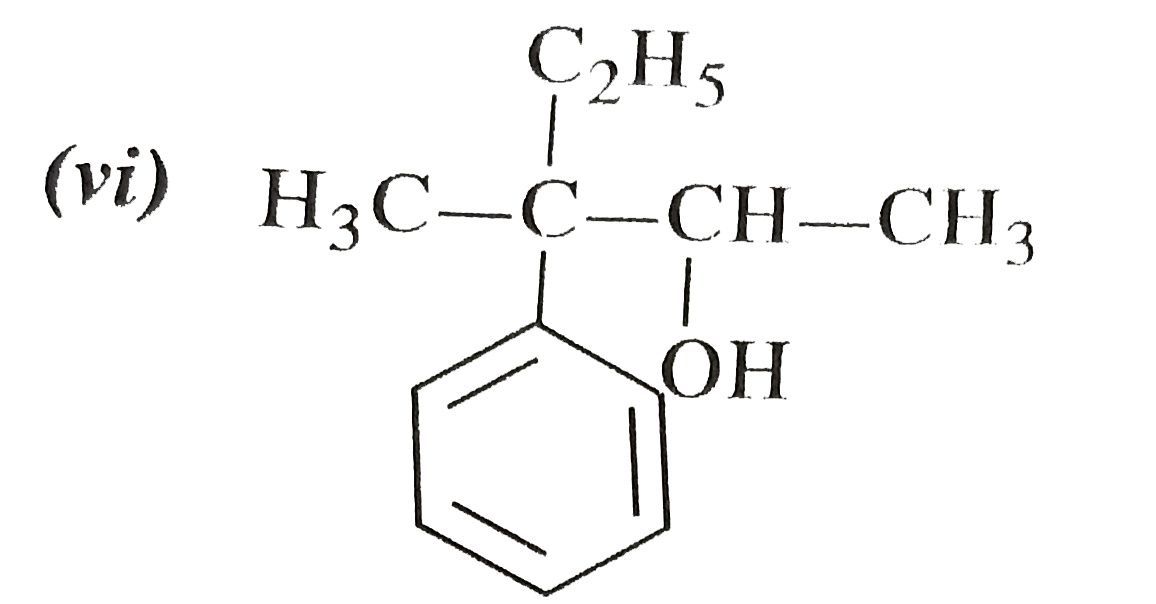यौगिक (iii) को शेष यौगिक से विभेदित करने के लिए निम्नलिखित में से कौन सा अभिकर्मक सबसे उपयुक्त है?
(i) CH3−C≡C−CH3
(ii) CH2−CH2−CH2−CH3
(iii) CH3−CH2−C≡CH
(iv) CH3−CH=CH2
कार्बन टेट्राक्लोराइड में ब्रोमीन
ऐसीटिक अम्ल में ब्रोमीन
क्षारीय KMnO4
अमोनियम सिल्वर नाइट्रेट
The correct Answer is:D
(d) CCl4 में Br2 (a) CH3COOH में Br2 (b) तथा क्षारीय KMnO4 (c) सभी असंतृप्त यौगिकों से अभिक्रिया करता है, अर्थात् 1. 3 तथा 4, जबकि अमोनियामय AgNO3 (d) केवल सीमान्तीय ऐल्काइनों अर्थात् 3 से अभिक्रिया करता है, अत: 3. 1.2 तथा 4 में से अमोनिकल AgNO3 (d) की सहायता से पहचाना जा सकता है।
Topper's Solved these Questions
Similar Questions
प्लान्क स्थिरांक का मान 6.63×10−34 जूल/सेकंड है तथा प्रकाश का वेग 3×1017 नैनोमी/सेकंड−1 निम्न में से कौन-सा मान 6×1015सेकंड−1 वाली आवृत्ति के प्रकाश की क्वांटा की नैनोमीटर में तरंगदैर्ध्य के निकटतम होगा ?
View Solutionनिम्नलिखित में से कौन सा कथन हाइड्रोजन के लिए असत्य है
View SolutionIn which of the following compounds corban atom undergoes hybridisation of more than one type
(i) CH3CH2CH2CH3
(ii) CH3−CH=CH−CH3
(iii) CH2=CH−CH2−CH3
(iv) H−C≡C−H
View SolutionGive the IUPAC names of the following :
(i) CH3−CH=CH−CH=CH2
(ii) CH3−CH2−CHO
(iii) CH−O∣∣C−CH2−CH3
View SolutionGive the IUPAC names of the following compounds:
(i)C6H5−CH2−CH2−OH (ii)CH3−CH3∣C∣CH3−CH2−CH2−OH
(iii)[(CH3)2CH]3COH. (iv)CH3−CH∣OH−CH2−CH2−O−CH2CH3
(v)CH3−CH2−CH∣Cl−CH∣CH3−CH3∣C∣OH−CH3 (vi)
(vii)(CH3)3COH (viii)CH3−CH∣CH3−CH∣OH−CH2−CH∣CH3−CH3
(ix) CH2OH |CH2−CH2−CH−CH−CH−CH3 | | CH2Cl CH3, (x) CH3−C=C−CH2OH | | CH3Br
(xi) CH2=CH−CH∣OH−CH2−CH3, (xii) CH2OH |CH3−CH−CH2−CH−CH−CH3 | | CH3 OH
View SolutionGive the IUPAC names of the following compounds : (i) {:(" "CH_(2)OH),(" |"),(CH_(3)-CH_(2)-CH-CH-CH-CH_(3)),(" |"" |"),(" "CH_(2)Cl" "CH_(3)):} (ii) {:(" "CH_(2)OH),(" |"),(CH_(3)-CH-CH_(2)-CH-CH-CH_(3)),(" |"" |"),(" "CH_(3)" "OH):} (iii) H_(2)C=CH-underset(OH)underset(|)(CH)-CH_(2)-CH_(2)-CH_(3) (iv)
View SolutionIndicate the type of hybridization of each carbon atom in the following molecules: (i) CH_(3)-C-=CH-CH_(3) (ii) H_(2)C=C=CH_(2) (iii) CH_(3)-CH=CH-CH_(3) (iv) CH_(3)-CH_(2)-CH_(3)
View SolutionWhat will be the increasing order of the stability of the following alkenes?
i) H2C=CH2
ii) CH3CH=CH2
iii) CH3CH2CH=CH2
iv) (CH3)2CHCH=CH2
v) (C)CH=CH2
View SolutionPredict all order of reactivity of the following compounds in dehydrohalogenation. a,. I. CH_(3)CH_(2)CH_(2)CH_(2)Cl II. (CH_(3))_(2)CHCH_(2)Cl III. (CH_(3))_(2)CH - CH_(2)Br IV. CH_(3)CH(Br)CH_(2)CH_(3) V. (CH_(3))_(3) C - Br b. I. CH_(3)CH(Br)CH_(3) II. CH_(3)CH_(2)CH_(2)Br III. (CH_(3))_(2) CH - CH_(2) Br IV. (CH_(3))_(3)C - CH_(2) Br
View Solutionनिम्नलिखित यौगिकों के आई.यु.पी.ए.सी.नाम लिखिए |
(i) (CH3)2CH−CH=CH−CH3−CH || CH3−CH−CH ∣ C2H5
(ii)
CH2=C(CH2CH2CH3)2
(iv) CH3CH2CH2 CH2CH2CH3 | | CH3−CHCH=C−CH2−CHCH3 ∣ CH3
View Solutionनिम्नलिखित यौगिक का सही नाम है -
CH3 |CH3CH2−C=CH−CH−CH2−CH3 |CH3CH2−CH−CH2−CH2−CH3
View Solutionनिम्नलिखित यौगिकों के IUPAC नाम लिखिए-
(i) CH3 |CH3−CH2−CH−CH−C−CH3 | | | CH3 I CH3
(ii) Cl |CH3−CH2−CH−CH−C−CH3 | | | CH3 OH CH3
View Solutionwrite the IUPAC name {:(CH_(3)CH_(2)CH_(2)CH_(2)" "CH_(2)CH_(3)" "CH_(3)),(" | | |"),(" "CH_(3)-CH-C=CH-CH_(2)-CH-CH_(3)):}
View Solutionयौगिक (iii) को शेष यौगिक से विभेदित करने के लिए निम्नलिखित में से कौन सा अभिकर्मक सबसे उपयुक्त है?
(i) CH3−C≡C−CH3
(ii) CH2−CH2−CH2−CH3
(iii) CH3−CH2−C≡CH
(iv) CH3−CH=CH2
View SolutionPredict all order of reactivity of the following compounds in dehydrohalogenation. a,. I. CH_(3)CH_(2)CH_(2)CH_(2)Cl II. (CH_(3))_(2)CHCH_(2)Cl III. (CH_(3))_(2)CH - CH_(2)Br IV. CH_(3)CH(Br)CH_(2)CH_(3) V. (CH_(3))_(3) C - Br b. I. CH_(3)CH(Br)CH_(3) II. CH_(3)CH_(2)CH_(2)Br III. (CH_(3))_(2) CH - CH_(2) Br IV. (CH_(3))_(3)C - CH_(2) Br
View SolutionWrite down the IUPAC names of the given compounds. a) CH_(3)CH_(2)CH_(2)CH(CH_(3))CH_(3) b) CH_(3)CH(CH_(2)CH_(3))CH_(2)CH_(2)CH_(3) c) CH_(3)CH_(2)CH=CHCH_(2)CH_(2)CH_(3) d) CH_(3)CH_(2)CH_(2)CH_(2)CH_(2)CH_(3) e) CH_(3)CH_(2)CH(CH_(3))CH(CH_(3))CH_(3) f) CH_(3)CH(CH_(3))CH_(2)C(CH_(3)CH_(3))CH_[3) g) CH_(3)CH_(2)CH(OH)CH_(2)CH_(3) h) CH_(3)CH_(2)CH_(2)CH_(2)Cl i) CH_(3)CH_(2)CH_(2)COOH
View Solution
